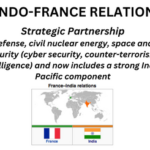India, Russia to establish a ‘2+2 ministerial dialogue’: Convergence, Irritants

India and Russia agreed to establish a “2+2 ministerial dialogue” between foreign and defence ministers to add further momentum to the bilateral strategic partnership. Russia now has become part of a small group of countries with whom India has 2+2 dialogue of foreign and defence ministers. India has such mechanism with the US, Japan and Australia.
LEARNING FROM HOME/ WOTHOUT CLASSES/ BASICS
Relations between India and Russia are rooted in history, mutual trust and mutually beneficial cooperation. This is a strategic partnership that has withstood the test of time, and which enjoys the support of the people of both countries. In 2000, during the visit of President Putin to India, the partnership acquired a new qualitative character, that of a Strategic Partnership.
During the visit of the Russian President to India in December 2010, the Strategic Partnership was elevated to the level of a “Special and Privileged Strategic Partnership.” 2017 is special for both India and Russia as the countries mark the 70th anniversary of the establishment of diplomatic ties. Moscow and New Delhi established diplomatic relations on April 13, 1947. Relations between both countries encompass diverse fields including Defence, Space, Nuclear energy and economic covering Bilateral and Multi lateral forums.
Both countries cooperate closely within the United Nations, BRICS and G-20 groupings, as well as in the various structures in the Asia Pacific region such as ASEAN and East Asia Summit Forum. Russia supported India’s membership to the SCO(The Shanghai Cooperation Organization) and India was admitted as a full member of SCO in 2017.
India-Russia military technical cooperation has evolved from a simple buyer – seller framework to one involving joint research, development and production of advanced defence technologies and systems. Both countries are cooperating in the manufacture of the “Brahmos” missile system and licensed production in India of SU-30 aircraft and T-90 tanks. They reportedly plan to jointly manufacture AK-203 rifles, involving full technology transfer; buying Russia s S-400 missile system – providing India with a sophisticated anti-aircraft weapon – Joint design and development of the Fifth Generation Fighter Aircraft.
manufacture of Sputnik V in India
India’s Gaganyaan programme andreflects growing convergence in field of space
To promote smoother and greater movement of businessmen, the two countries signed a protocol on December 2015 to simplify visa procedures for businessmen.
Framework agreement on cooperation in the peaceful uses of outer space, including satellite launches, GLONASS navigation, remote sensing and other societal applications of outer space. In June 2015, the space agencies have signed an MoU on expansion of cooperation in the field of the exploration and use of outer space for peaceful purposes; the completion of the Russian phase of training of the four astronauts for India’s first manned space mission.
Russia is an important partner in peaceful uses of nuclear energy and it recognizes India as a country with advanced nuclear technology with an impeccable non-proliferation record signed the Strategic Vision for strengthening cooperation in peaceful uses of atomic energy between India and Russia. Kudankulam Nuclear Power Plant (KKNPP) is being built in India with Russian cooperation. An agreement on localization in India of nuclear equipment was also concluded during the Annual Summit on 24 December 2015.
IRRITANTS
Moscow sees the Quad and Indo-Pacific concept as hostile to the interests of Russia and China; Termed it Asian Nato
Russia has moved notably towards China since 2014 because of the pressure and sanctions of the West, particularly the US, on the Ukraine and Crimea issues. Its cooperation with Pakistan in defence, energy and security has also increased significantly, primarily due to its interest in reaching out to the Taliban much to the disquiet to India.
WAY OUT
Both countries need to revive the economic agenda that is currently heavily dependent on cooperation in defence and energy sectors; also guides the proposed Chennai-Vladivostok Maritime Corridor, where apart from improving trade ties with the Russian Far East. It may, also, be useful to discuss reviving the cooperation between India, Iran and Russia on Afghanistan.




0 Comments